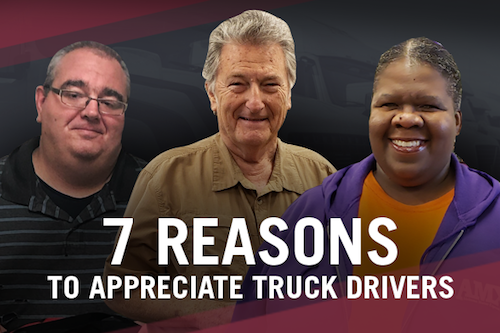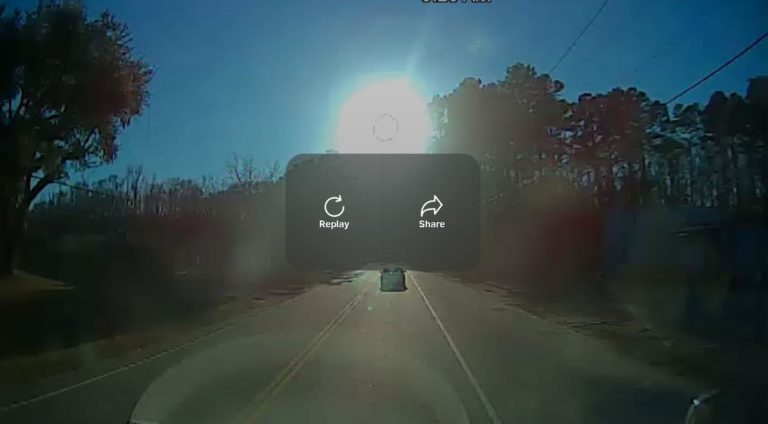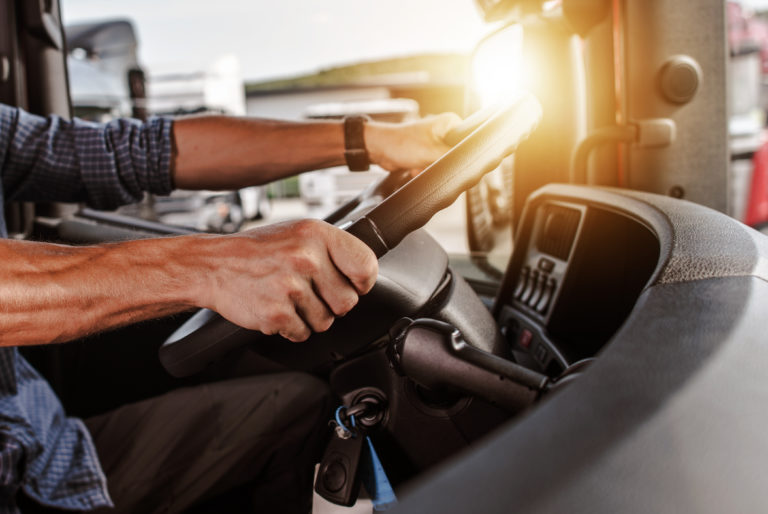[vc_row][vc_column][vc_column_text css=”.vc_custom_1578339859420{margin-bottom: 0px !important;}”]We’ve all made the signature “arm pump” and directed it toward a truck driver in hopes that we get a burst from the air horn in return. It’s one of the first things we learned about truck drivers. But there’s so much more to discover about the millions of men and women who make our country move forward while carrying 80% of the products we use every day.
In honor of National Truck Driver Appreciation Week, let’s dig deeper into the lives of our nation’s truck drivers:
They’re better drivers than us
Truck drivers must complete rigorous training before getting behind the wheel, including special licensing, schooling and testing. They’re also held to higher standards in the cab. The extra steps help keep us safe. Truck drivers have an overall crash rate 29% less than other drivers. When there’s a crash between a commercial truck driver and a passenger driver, it’s the fault of the passenger vehicle driver about 75% of the time.
The insurance market is a lot like the trucking industry in at least one way — less capacity drives higher prices. 2019 has seen transportation insurance premiums increase by as much as 20% as insurance companies reacted to last year’s high traffic levels. It’s a trend that’s plagued the industry for years. Rates have doubled, or even tripled, since the beginning of the decade.
We don’t expect insurance rates to curb any time soon. Companies are outfitting advanced technologies on more rigs, including mandated ELD systems, so premiums will rise as the value of trucking assets increase. In addition, liability insurance — and litigation suits and payouts — are putting many companies in financial peril. Expensive umbrella policies are common as companies try to protect themselves.
We can’t live without them
If the supply chain for goods in a metropolitan area was stopped, it’s estimated that hospitals would run out of life-saving supplies within 24 hours. Service stations would run out of fuel within 48 hours. And grocery stores would lose perishables within 72 hours.
It’s about to become a lot busier.
The Port of Savannah is already the 4th busiest port in North America. A $2B project to double its traffic within a decade is underway. As container traffic increases, trucking companies and 3PL services are getting creative with how they move freight.
The entire supply chain — including shippers, trucking companies, 3PLs and freight technology companies — is relying more on chassis sharing to move more freight to multiple destinations in Freight Alley with fewer delays and for less cost. As most ocean carriers leave the chassis ownership market, trucking companies will continue to expand their own chassis fleets in order to manage capacity constraints from rising cargo volumes and driver shortages. Or, they’ll lease chassis to optimize every haul.
There’s not much room to stretch at the “office”
An 8-hour workday can move pretty quickly. But even when it’s slow, you’re free to stand up and move around or stretch. Imagine life in a truck cab, with all controls designed specifically to keep you from stretching too far — for the better part of 14 hours.
The job comes first, and our nation’s drivers are committed to it. There’s always time to rest — after the job is done. Plus, while their personal truck space may be small, they’re responsible for maintaining every part of the 53-foot trailer, or “office,” as it moves at speeds up to 70 mph.
They’re more diverse
The truck driving industry includes a wide range of drivers with diverse backgrounds. Many drivers come from other industries. And more than 40% of the drivers on the roads today are minorities, compared to only 22% of all U.S. workers. Women are among those leading the way, with more than 200,000 long-haul female drivers at the wheel.
They always offer relief when we need it
“Neither snow nor rain…” The U.S. Post Office may have the clever unofficial motto about trudging through inclement weather to get the job done. But it’s actually more fitting for truck drivers.
Every second, of every day, there are tens of thousands of trucks (or more) on our roads in every type of weather imaginable. Even in areas ravaged by hurricanes, snowstorms, earthquakes and other natural disasters, truck drivers make their way through — bringing goods and supplies to those in need.
They’re IT experts
Today’s truck drivers constantly use a wide range of new, advanced technologies, including telematics, to perform their daily tasks.
Every commercial truck is equipped with an electronic logging device (ELD) to record driving hours. They use voice commands on their smartphones to communicate with dispatchers and customers. They track their journeys using GPS. We keep hearing about the potential of autonomous vehicles, but right now, it’s the drivers themselves who are running the machines.
They help each other — and eat chicken soup
Nobody knows the challenges of the job more than other truck drivers. That’s why drivers dim headlights out of courtesy the moment they enter a truck stop. And, why they flash their lights to let other drivers know it’s safe to pass. And, why they warn each other about anything out of the ordinary. They even pull forward immediately, before they purchase snacks, after refueling to let the next driver begin fueling.
Sometimes, they even treat each other to chicken soup. One of our drivers, Jeremy, was on his way to San Antonio when he heard that an older driver nearby had the flu. Jeremy called the office and asked if he could push his load in order to help the older driver. After they settled the load — and had a couple of bowls of chicken soup — Jeremy returned to his rig. Our dispatchers worked everything out with Jeremy’s customer ahead of time.
That’s what drivers do. They go further. They work harder. They do their jobs like nobody else.
Celebrate Truck Driver Appreciation Week
So, the next time you see a truck driver, go ahead and pump that arm. They’ll be more than happy to oblige. And if you ever get a chance to say “thank you” for the difficult job they do and its incredible impact on our country — I’m sure they’d appreciate that, too.
Collins White, President, AMX Logistics[/vc_column_text][/vc_column][/vc_row][vc_row][vc_column][mk_image_slideshow images=”744,745,747,746,748,749,750″ image_width=”1000″ image_height=”550″][/vc_column][/vc_row]


